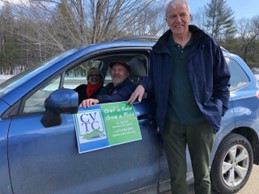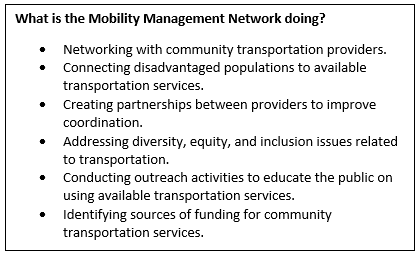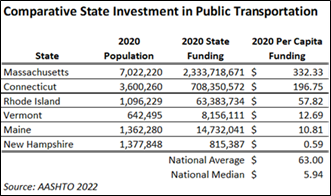The information contained in this article is not intended as legal advice and may no longer be accurate due to changes in the law. Consult NHMA’s legal services or your municipal attorney.
In our car-dependent culture, many of us don’t often think about what happens if we lose our ability to drive, even if it’s just temporary. Still, if you needed to get to the doctor, grocery store, pharmacy, or anywhere else, how would you, if you couldn’t drive? New Hampshire’s most vulnerable populations face this dilemma every day. Older adults, individuals with disabilities, veterans, immigrants, refugees, and others who can’t afford to drive or are physically or mentally unable to drive often become isolated if they have no means to get where they need to go.
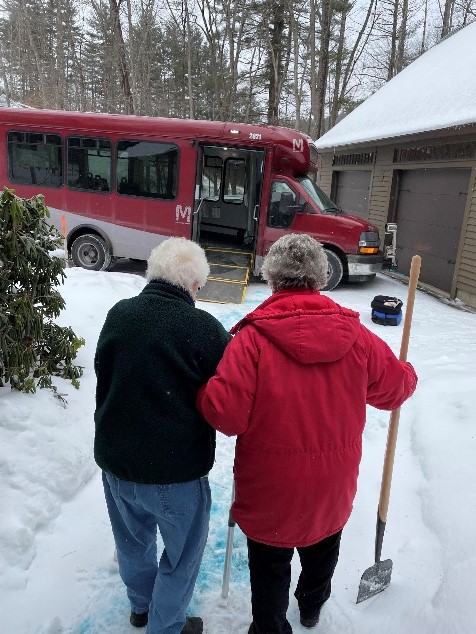
At some point in our lives, many of us will have to face the difficult moment when we realize we should no longer drive. Often this moment is when we are 80 or older. By 2040, the number of 80+ year-old individuals are projected to more than triple in the state. Local, regional, and state agencies and stakeholders, transportation service providers, regional mobility managers, and Regional Planning Commissions across the state have come together to collaborate on improving education, outreach, and coordination of transportation services. This article is just one effort to help improve understanding of community transportation services in New Hampshire.
What is community transportation?
Community transportation refers to all transportation resources that are available to help meet community mobility needs. These include both public and private services, such as shuttles for older adults, vans that organizations own and operate, and other programs such as volunteer driver programs. Community transportation provides flexible and accessible solutions in response to unmet local transport needs.
What types of transportation options exist in New Hampshire?
Only 25 communities in New Hampshire are served by traditional fixed route or flex-route public bus service that most of us think of as public transportation. The state has four urban transit providers, including COAST in the Seacoast, Manchester Transit Authority (MTA) which now includes the Greater Derry-Salem CART system, Nashua Transit System (NTS) and UNH Wildcat Transit. Another six rural transportation agencies provide varying levels of service in Belknap, Carroll, Coos, Merrimack, Grafton and parts of Sullivan and Cheshire Counties.
Fixed route transit can’t be operated efficiently in rural areas lacking adequate population density. In these rural areas the most cost-effective approach to providing accessibility is advance-reservation service (sometimes called demand-response) that is usually limited to older adults and people with disabilities that prevent them from driving. Often these services restrict trips to only specific purposes such as medical appointments, grocery shopping or accessing senior activity centers.
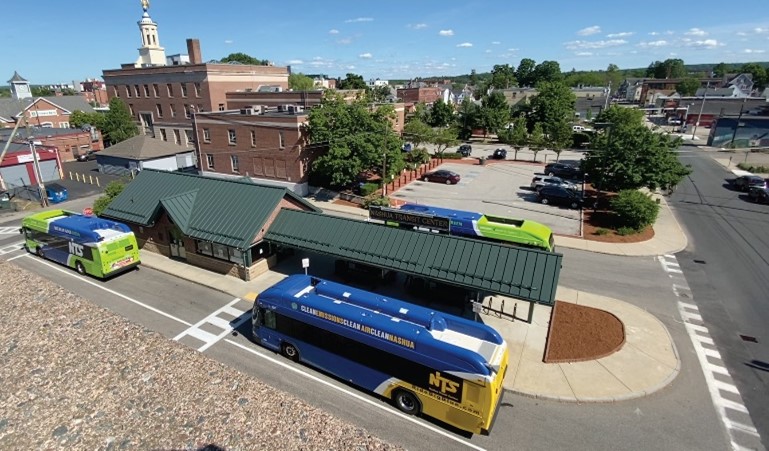
Over 40 non-profit organizations provide this sort of transportation in clusters of communities around the state. These include senior centers, meals on wheels programs, support organizations for people with disabilities, and healthcare providers. Twenty-five publicly accessible volunteer driver programs make up a large share of these services and cover 197 of New Hampshire’s 234 communities; though in many cases the capacity of the volunteer corps limits the number of trips that can be provided.
To find more about transportation services in your area visit: https://www.nh.gov/dot/programs/scc/rcc.htm
What impacts do volunteer driver programs have on people’s lives ?
Volunteer Driver Programs (VDP) provide rides at no cost to residents of the communities they serve. The programs depend on the volunteer drivers who give their time and driving ability to help residents maintain their health and independence by improving their access to essential services. VDPs are sometimes the only affordable community transportation option for people living in rural areas of the state.
A 2021 Community Volunteer Transportation Company (CVTC) Driver and Rider Survey revealed that benefits accrue to both riders and volunteer drivers in the vastly rural 34 town Monadnock Region they serve. Some survey participants shared:
- "I am pretty much stuck at home 24/7, so it is nice to meet new people and chat on the ride.”.
- “Bob took me to chemo for about a year - we had a lot of fun talking and laughing. Made an unpleasant situation much easier on me. “
- It's rewarding to work for this great organization. I get back much more than I give,” was a common sentiment expressed by CVTC volunteer drivers.
Finding a volunteer driver program (VDP) can be challenging. Thanks to the NH Alliance for Healthy Aging (NHAHA) and their partners, a website was recently created to assist those wanting to volunteer and those wanting to utilize VDPs. In addition to launching a statewide volunteer driver recruitment effort to support the state’s many VDPs, the NHAHA website provides FAQs about VDPs and what it means to be a volunteer driver as well as an interactive map with a complete listing of available VDPs by county: https://nhaha.info/volunteer-driver-initiative/.
Transportation Coordination, Resources and Initiatives
While New Hampshire does not have an extensive traditional public transportation network, it is gaining some national attention with its community transportation network. Within this network, older people, individuals with disabilities, veterans, and low-income individuals make connections with volunteer driver programs, public transit systems, and other transportation providers. With the guidance of many state, regional, and local partners, the State Coordinating Council for Community Transportation (SCC) has built a Mobility Management Network to ensure coordination of services, increasing the efficiency and effectiveness of transportation for residents across the state. This Network allows individuals to connect with transportation options throughout New Hampshire. The Mobility Managers are also connected with their Regional Coordinating Councils (RCC), which are comprised of transportation providers, funding agencies, citizens, health organizations, and social services.
How is community transportation funded in New Hampshire?
Public transit and most other community transportation in New Hampshire are funded with a combination of federal, county, local, private, and (to a limited degree) state dollars. For fixed route public transit providers in particular, the Federal Transit Administration (FTA) is the largest source of funding. FTA dollars need to be matched with non-federal funds, and that match rate varies by how the FTA dollars are used. Averaged together, FTA funds cover 60%-65% of total costs for most public transit service in New Hampshire. The needed matching funds come mostly from municipal contributions, advertising on buses and bus stops, charitable grants and other sources.
In much of the country, state legislatures provide a large portion of the non-federal match. In New Hampshire the state assists with partial match for capital vehicle purchases but contributes only minimally to transit operations with $200,000 per year split among all transit agencies statewide – enough to support 3-4 days of service. Nationally, in 2020, the median per capita state investment in public transportation was $5.94. The New Hampshire Legislature, in comparison, invested $0.59. Our two small, largely rural peer states of Maine and Vermont invest 18 to 21-times what New Hampshire does to provide transportation options that help seniors live independently with dignity and help connect employers to an adequate workforce.
Meaningful state investment has become still more important with the passage of the federal Bipartisan Infrastructure Law last year. This bill provides for a close to 30% increase in FTA funding, but without additional state or other non-federal match investment, much of this needed new federal funding will be left on the table for lack of match.
Responding to years of local and regional studies on unmet transportation needs, NHDOT’s Prioritized Needs budget proposal for the 2024-2025 biennium includes an increase in public transit operating assistance to $664,999 in SFY2024, and $1,744.550 in SFY2025. While this would still be just a down-payment on the level of investment required to meet current and anticipated transportation access needs for those needing transit assistance, it would be a significant step. Expanding state investment in transit to reduce downshifting of costs to municipalities is among NHMA’s legislative priorities for the current budget cycle. Getting these amounts into the final state budget will require communication from municipalities statewide to their legislators.
How can individual municipalities support community transportation?
Even with an increase in state funding, there will still be a need for local investment in community transportation. One of the easiest approaches to funding local transportation needs, aside from property tax, is a local vehicle registration fee. Under RSA 261:153 IV, the legislative body of a municipality may vote to collect a supplemental vehicle registration fee of up to $5.00 (paid at the time of vehicle registration) for the purpose of supporting a Municipal Transportation Improvement fund. As of 2022, 34 municipalities have adopted this fee to fund local transportation needs. These funds can be used by the municipality to support improvements to roads, bridges, bicycle and pedestrian facilities, parking, and most importantly, public transportation.
Written by Scott Bogle, Rockingham Planning Commission; Ben Herbert, Southern New Hampshire Planning Commission; Terry Johnson, Southwest Regional Planning Commission; Donna Marceau, Nashua Regional Planning Commission; and Sylvia von Aulock, Southern New Hampshire Planning Commission. You may reach them at https://www.nharpc.org/
